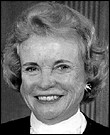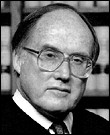A Draft Resolution of Congressional Censure
Against
United States Supreme Court Justices
A Draft Resolution of Congressional Censure
Against
United States Supreme Court Justices
Kennedy, O'Connor, Rehnquist, Scalia, and Thomas
for
Their Betrayal of the American People and the United States Constitution
Displayed in the Decisions of
Bush v. Gore
Letter of Introduction
The Counts of Censure
I. Applicable Laws and Principles
II. The Legal Controversy in Florida
III. The U.S. Supreme Court's Intervention
IV. The U.S. Supreme Court's Decision
V. The Anomalous Nature of the Per Curiam Rulings
VI. The Tragic Impact of the Supreme Court's Rulings
VII. The Voice of Memory
Therefore it is resolved that . . .
Act Now
PDF Version of Resolution
Acknowledgments
Dedication
Media
Contact Us
Why Censure?
Based on both applicable law and historical precedent, plenty of time remained to manually examine and tally these 175,000 ballots, the majority of which contained easily decipherable votes.
Accordingly, on December 8, 2000, the Florida Supreme Court ordered a manual recount of a substantial portion of these uncounted ballots.
The rest is history.
On December 9, 2000, five members of the U.S. Supreme Court stunned the nation by halting the Florida manual recount. Justices Rehnquist, Scalia, Thomas, O'Connor, and Kennedy claimed they wished to review its constitutional validity.
With two rounds of Florida election litigation behind them and the presidency hanging in the balance, Americans of all political stripes trusted the U.S. Supreme Court to provide for a satisfactory means of assessing the will of Florida's voters.
When night fell on December 12, that faith was betrayed.
There would be no accurate and complete count of votes in Florida.
The five conservative justices had ruled that Florida's partial recount violated the Fourteenth Amendment's Equal Protection clause. But instead of remanding the case to Florida for a new full recount compliant with constitutional requirements, they simply froze Harris's certification in place and secured the presidency for their fellow Republican.
How did they do it?
In a brazen act of deceit, the five-justice majority issuing the Court's per curiam decision knowingly misrepresented December 12 as Florida's chosen deadline for completing the vote count. They held that Florida law allowed no time to count the remaining 175,000 votes:
[December 12] is upon us, and there is no recount procedure in place under the State Supreme Court's order that comports with minimal constitutional standards. Because it is evident that any recount seeking to meet the December 12 date will be unconstitutional for the reasons we have discussed, we reverse the judgment of the Supreme Court of Florida ordering a recount to proceed. Bush v. Gore, 531 U.S. 98 (December 12, 2000).
This overt misrepresentation of Florida election law flabbergasted members of the legal profession from coast to coast. These same justices who on so many prior occasions had championed the rights of states had now casually and willfully nullified Florida law.
Ten days later, Florida Supreme Court justice Leander J. Shaw issued a calm, reasoned, and devastating rejoinder, one that has been overlooked to this day:
[I]n my opinion, December 12 was not a 'drop-dead' date under Florida law. In fact, I question whether any date prior to January 6 is a drop-dead date under the Florida election scheme. December 12 was simply a permissive 'safe-harbor' date to which the states could aspire. It certainly was not a mandatory contest deadline under the plain language of the Florida Election Code (i.e., it is not mentioned there) or this Court's prior rulings. Gore v. Harris, 773 So. 2d 524 (December 22, 2000) (Shaw, J. concurring; emphasis in original).
Why do we accuse the Five of grave deceit as to Florida's alleged December 12 deadline and not just all-too-human error?
Consistent with identical laws in all fifty states, Florida requires that its slate of Electoral College delegates be awarded to the presidential candidate getting the most popular votes statewide.
When the winner of that popular count is clear, each state's electors have the option under federal law to meet by December 12 in order to escape the technical threat of challenge by members of Congress. Due to the practical unlikelihood of such a challenge ever being raised, electors ordinarily meet in state capitals on December 18 to cast their votes. These results are forwarded to Washington, D.C. by December 27 and are tallied and verified in Congress on January 6.
However, when the victor of a state's presidential election is not clear and a manual recount is required to determine the popular vote result, precedent, common sense, and basic respect for the democratic process dictate that the state's deadline for designating its slate of electors be January 6, the day Congress officially tabulates the electoral vote. That date provides the maximum time reasonably available for a state to ensure that its electoral votes correspond to its carefully determined popular vote winner.
Certainly the Florida legislature gave no advance indication whatsoever that it wanted state officials to adhere to an earlier deadline at the expense of securing an accurate popular vote count.
In past elections, other states had taken care to get it right. For example, in the 1960 presidential race between John F. Kennedy and Richard Nixon, Hawaii awarded its electors on January 4, 1961 based on a just-completed recount. These electors were readily accepted two days later in the tabulation of electoral votes.
In 1960, the people of Hawaii had their say. But in 2000, the Court's conservative majority did not let the people of Florida have theirs.
Instead, the Five falsely asserted that Florida had imposed a December 12 "safe harbor" deadline in lieu of an accurate vote tabulation. The attribution to Florida officials of this preposterous preference for insulating an inaccurate count from Congressional challenge, we submit, is a clear smoking gun proving the intentional nature of the Five's misrepresentation of Florida's deadline.
Again, Justice Shaw's reaction is telling. Groping for a benign explanation of what otherwise appeared to be a judicial coup d'etat unprecedented in American history, he wrote that the Five had "confuse[d] apples and oranges"—that they had incorrectly cited in the second (contest phase) case the Florida Supreme Court's discussion of the December 12 "safe harbor" deadline in the first (protest phase) case. Gore v. Harris, 773 So. 2d 524, 528 fn. 12 (December 22, 2000).
This sort of mix-up simply doesn't happen by accident.
U.S. Supreme Court justices—among the most intellectually gifted men and women in the United States—do not "confuse apples and oranges" negligently. It would have been obvious to the Five that the Florida Supreme Court's order to commence a careful statewide manual recount on December 8 did not further mandate that recount's hurried completion a mere four days later, on December 12.
No, the truth is that the Five willfully fixed the outcome of a presidential race in which more than 6 million Floridians and 100 million Americans had participated in good faith and prevented a national election from being concluded in the legally prescribed manner. And this is but one form of gross misconduct by the Five that can be equally substantiated in connection with their handling of Bush v. Gore.
So what is to be done?
Article III, Section 1 of the U.S. Constitution states that federal judges are to serve during "good behavior" and not have their compensations reduced during their continuance in office. If the Five's willful, premature conclusion of a presidential election vote count for partisan purposes is not wrongdoing beyond the pale, then nothing is left of this "good behavior" clause.
And yet no one in a position of countervailing power has seen fit to call them on it.
We believe this to be a dangerous mistake.
Why? Not only because it holds the Five harmless at the bar of history. But because it can happen again.
We dare not assume that President Bush's selection by the Court was a one-time aberration. Enterprising Republican lawyers can file future post-Election-Day complaints in federal court. Left unrebuked, Justices Rehnquist, Scalia, Thomas, O'Connor and Kennedy are obviously capable of shamelessly reprising Bush v. Gore in 2004 or beyond, in the event a close election provides the opportunity. And future justices—of any political persuasion—may feel similar license if the Five remain unchallenged.
The horrific September 11, 2001 attacks and their momentous aftermath remind us of the historic importance of each presidential election and of the need to safeguard the integrity of democratic succession to the most powerful office in the history of civilization.
When five unelected Supreme Court justices substitute their political will for that of the American electorate, that integrity is obviously compromised. The peaceful and democratic transfer of executive power—a hallmark of our Republic for over two hundred years—is placed at risk.
It is time to insist that Congress act now to stop these five determined ideologues from further subverting the nation's democratic institutions, processes, and character.
A strenuous concurrent resolution of censure requiring but a simple majority of both houses of Congress would record for posterity the gravity of the Five's wrongdoing and emphatically declare the American people's rejection of Bush v. Gore's dangerous precedent.
We have prepared and posted just such a resolution here, online, at www.censurethefive.org. We commend to the United States Congress its immediate introduction and passage.
Eric C. Jacobson
Public Interest Lawyer
Founder, The Supreme Court Five Censure Campaign
ecjla@aol.com
David Harnden-Warwick
Writer, Activist
Organizer, The Supreme Court Five Censure Campaign
davidh-w@attbi.com




